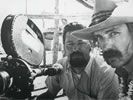Eye For Film >> Movies >> Easy Riders, Raging Bulls (2003) Film Review

It's only when you watch an in-depth documentary such as Easy Riders, Raging Bulls that you realise how much second-rate rubbish TV-makers now foist on us in the name of factual entertainment.
Thankfully, this informative romp through 70s cinema has chosen its talking heads carefully. You won't find any dodgy Z-listers here - or at least, if you do, they will still have something sensible to say about the film-making in the decade of flares and platforms.

Based on Peter Biskind's book of the same name, the film-makers set about quizzing the great and the good from the 70s as to how - and indeed if - the "sex, drugs and rock'n'roll generation saved Hollywood".
While the really big-hitters such as Martin Scorsese, Steven Spielberg and Francis Ford Coppola have, understandably, given this a body-swerve, there are plenty of influentials still ready to step up to the mic.
Enter Dennis Hopper - whose battle with addiction is surely one of the most documented in Hollywood - Peter Bogdanovich - who seems to have been almost as much of a stud as Warren Beatty - and a host of actors, actresses and producers, including Cybill Shepherd, Ellen Burstyn and Karen Black - who doesn't seem to have quite come down from that 70s high yet.
They candidly discuss the background to movies such as Easy Riders, Rosemary's Baby and The Godfather - a background which apparently involved a lot of parties, a considerable quantity of drugs and quite a bit of sleeping around. Interestingly, they also talk about the 'new generation' of film-makers - including Spielberg and Lucas - who were to create the first blockbusters.
The quality of the vox pops is matched by the standard of vintage footage included. There are trailers for long-since forgotten, yet influential, films such as Wild Angels ("getting their kicks from violence and torture" don't you know?) alongside interviews from the time, from the likes of Roman Polanski. And while it is clear there was a lot of partying going on - to a fatal extent in the cases of director Sam Peckinpah and producer Julia Phillips - the film doesn't just wallow in the salacious, it also rejoices in the radically different directional methods used by each of the famous names.
This is a comprehensive and uncompromising look at some of the films that still influence many independent filmmakers today - an absolute must for fans of Seventies cinema and a wide-ranging and thoughtful introduction for those who have yet to discover it.
Reviewed on: 10 Aug 2006

















